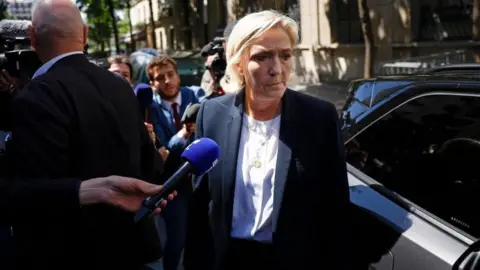A growing number of candidates and activists in France have been targeted with violent or verbal attacks in the run-up to Sunday’s tense final round of parliamentary elections.
Government spokeswoman Prisca Thevenot was putting up election posters with her deputy and a party activist in Meudon, south-west of Paris, when they were brutally assaulted by a gang of youths.
Other election campaigners have come under attack across France, reflecting the febrile mood in politics with the far-right National Rally (RN) the front-runner in the election.
The motive for the attack on Ms Thevenot and her colleagues is not clear, but she returned to Meudon on Thursday with Prime Minister Gabriel Attal, who condemned “attacks of intolerable cowardice”.
Images filmed from a block of flats showed the youths swarming around the candidate, her deputy Virginie Lanlo and a party activist for President Emmanuel Macron’s Ensemble alliance.
Ms Thevenot told Le Parisien website that when she and her colleagues objected to the youths defacing party posters “they immediately attacked one of my activists, injuring Virginie”. Ms Lanlo suffered an arm injury, while the activist was punched and hit with a scooter, ending up with a broken jaw. The car windscreen was also smashed by the scooter.
Three teenagers and a man aged 20 were arrested by police and the incident was quickly condemned across the political spectrum.
Mr Attal called on people to “reject the climate of violence and hatred that’s taking hold”, while RN leader Jordan Bardella said one of his “big commitments as prime minister” would be to “combat record insecurity and repeat offending”.

Interior Minister Gérald Darmanin has announced that 30,000 police will be deployed across France for Sunday’s vote in an attempt to prevent “the ultra-left or ultra-right” from stirring up trouble.
The BBC spoke to voters in his constituency in northern France on Thursday who said they feared youths would go on the rampage whoever won, to express their anger at the political system.
Law and order is one of RN’s big priorities, alongside immigration and tax cuts to target the cost-of-living crisis.
RN candidates have also come under attack. Marie Dauchy described being “violently assaulted” as she campaigned at a market in La Rochette near Grenoble in the south-east.
A conservative candidate allied with RN, Nicolas Conquer, complained that he and a female colleague had been pelted with eggs. And last month another RN candidate was treated in hospital after he was set upon while handing out pamphlets.
French election candidates withdraw in bid to block far right
In Marseille, pétanque masks political divides ahead of Sunday’s vote
Only far right can win majority, warns French PM
Having won 33.2% of the vote in the first round of the snap election, called out of the blue by President Macron, Mr Bardella’s party is now aiming to win an absolute majority in the 577-seat National Assembly.
But his political opponents have agreed to do all they can to block the far right from winning enough seats to form a government.
Seventy-six seats were won outright in the first round by candidates who won more than half the local vote in their constituency, including 39 RN candidates and their allies.
The other 501 seats will be settled in run-off votes, and 217 third-placed candidates have pulled out of the race to hand a rival a better chance of defeating RN. Of those 217 withdrawals, 130 candidates came from the left-wing New Popular Front and 81 from the Macron alliance.
Marine Le Pen has complained bitterly about the operation to secure “mass withdrawals”, and blamed those who sought to “stay in power against the will of the people”.
However, she said she thought there was still a chance of winning an absolute majority, if the electorate turned out in big numbers.
The latest Ifop poll suggests RN will win 210-240 seats, short of the 289 it needs to form a government. That is down on the 240-270 range of seats that it was estimated to win after the first round.
Nevertheless there is fear among some of France’s minorities of what RN might do if it gets into power.
It aims to give French citizens “national preference” over immigrants for jobs and housing and to abolish the right to automatic French citizenship for children of foreign parents, if those children have spent five years in France from the age of 11 to 18.
Dual citizens would also be barred from dozens of sensitive jobs.
One Muslim woman in a district that voted 54% for RN last Sunday told the BBC that RN was gaining ground with every election that took place.
On the eve of France’s quarter-final tie against Portugal in the European Championships in Germany, national football captain Kylian Mbappé called on voters to “make the right choice”.
After Sunday’s “catastrophic” first-round results, he said “we can’t put the country into the hands of those people”, without specifying who they were.





























